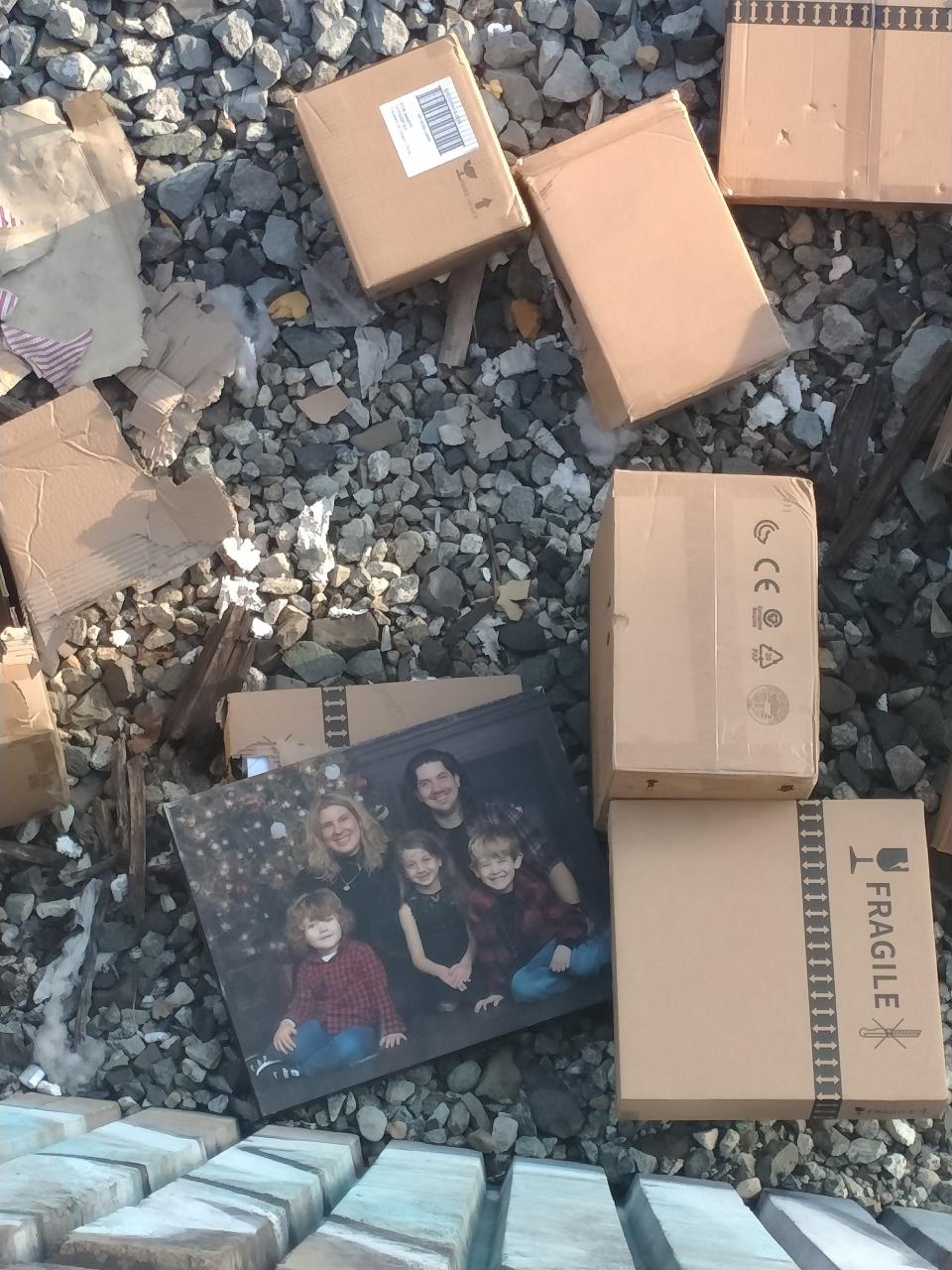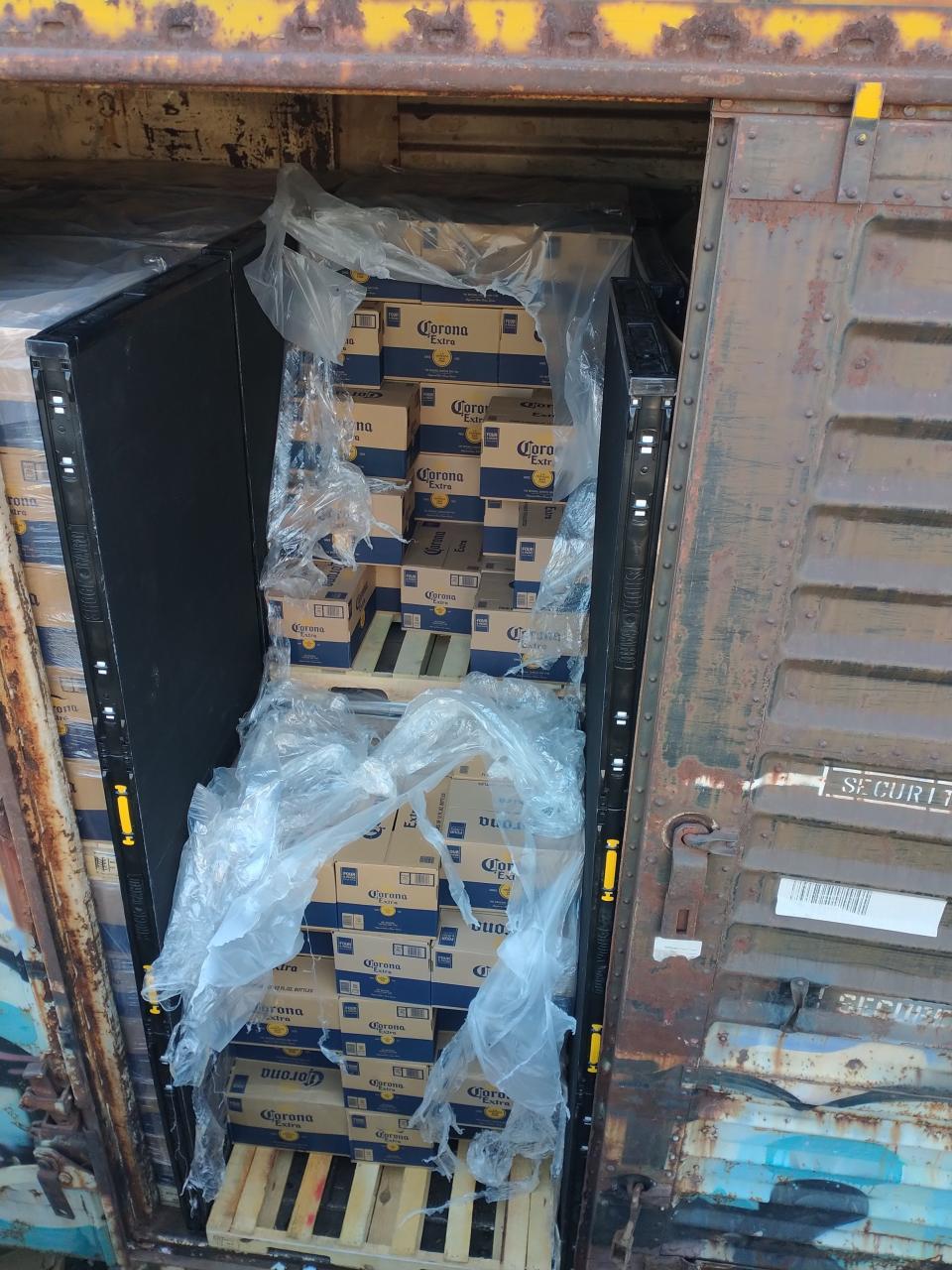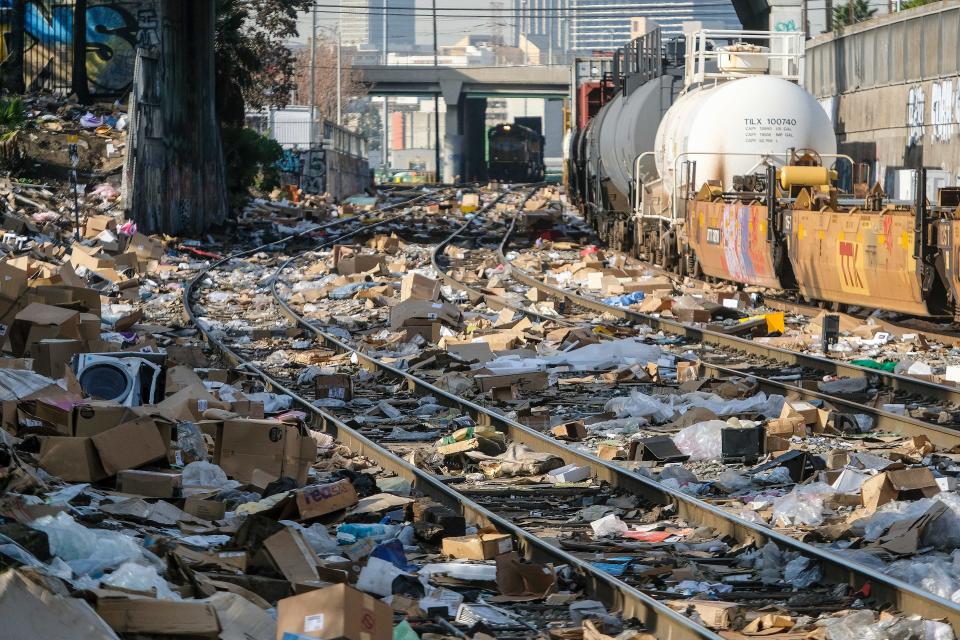The 'weakest link in the supply chain': Thieves looting LA trains like the Wild West
LOS ANGELES – Blue surgical masks and cotton balls. Car parts, pieces of tools and dozens of new toner cartridges for laser jet printers. Boxes from Macy's, Bath and Body Works and Amazon – all empty with postmarks to addresses across the country.
The railroad tracks in the Los Angeles neighborhood of Lincoln Heights look as though a twister swept through, with thousands of boxes, bags and trash littering the rails for blocks. For months, residents in the area say they've watched the chaos unfold at all hours.
Men working as a team crack open large shipping containers on idle trains then load stolen goods into trucks and vans. Some, they say, continue their missions even when a train is moving – jumping on a train and climbing atop the containers with power tools or bolt cutters to crack open the large metal boxes.
"This must stop. This is not the wild wild west," said Christopher Tang, a professor at the UCLA Anderson School of Management who studies supply chains. "Back then, thieves would steal money but now they're stealing merchandise that actually affects people's lives."
One of the country's largest railroad companies, Union Pacific, said they'd seen about $5 million in damages and thefts and noted on average, more than 90 shipping containers are looted per day.
The worsening trend is another potential hurdle in the nation's supply chain crisis as the ports in Los Angeles and nearby Long Beach – the two busiest in the country – attempt to rebound after a backlog caused largely by COVID-19. It's also reignited concerns by Californians about organized crime rings that authorities say are likely fueling these train thefts and a series of high-profile smash-and-grab thefts that have been occurring across the state.
Criminals target 'weakest link in the supply chain'
The opened boxes, bags and containers lining the tracks in the City of Angels could mean a lot more than a delayed delivery to your home.
Products used in the fight against COVID-19, such as face masks, IVs and large bags of cotton balls, could be seen scattered across the tracks. Boxes that held electronics and car parts also were spotted.
►'Spending more and getting less': How the pandemic, inflation take a financial toll on families

"Of course it isn't great to not get a package at your home but this problem is bigger," Tang said. "Some packages actually could affect someone's life, especially if you talk about medical supplies."
Tang said each shipping container can hold thousands of items and criminals have no way of knowing what is inside, forcing them to scour through items that might not be as valuable to them but are crucial to people's lives and replenishing national shortages. He added that the thefts also have a ripple effect on consumers as prices go up to make up for losses.
The containers are locked but experts say it takes a low amount of effort and possibly just a pair of bolt cutters to get inside.
"What we're seeing here is opportunism by organized members, of I'll call them gangs or mobs, that have identified a weakness in the supply distribution chains," said Keith Millhouse, a national expert on mass transit issues and rail safety based in Southern California.
Tang agreed, calling the railroads "the weakest link in the supply chain."
Millhouse said the solutions should be multifaceted, including investing "significant amounts of money on security," bolstering patrol officers in the area and improving fencing. He said trains could also alter scheduling to deter criminals and make it harder for such thefts.
He and others also said harsher criminal penalties could do a lot to deter criminals.
"It's going to take action by law enforcement, the freight railroad companies and perhaps changes in criminal sentencing procedures or guidelines to make this more difficult to happen and then to have consequences when it does happen," Millhouse said.
►Thanks for being a subscriber: Sign up for the Daily Briefing so we can stay in touch every day
Train thefts renew focus on organized crime across California
Marie Massa warmed up breakfast as the loud booms continued outside.
"What is that?" she asked her husband. "Can you go see what is happening?"
Outside, several men crowded around large shipping containers stacked on an idle train. They'd cracked open one of the containers and were rummaging through its contents. The group threw boxes from the train to a platform and sidewalk bordering the rails then loaded them into vans and trucks.
"It is scary," she said on the back porch of her home as she played with her 4-year-old son. "This never used to happen. I've called 911 several times about it and I don't know what we can do."
The area surrounding the stretch of tracks targeted most frequently by thieves is also home to a large homeless community, a frequent sight across Los Angeles. More than a dozen RVs and several tents lined one street bordering the tracks. One man in an RV parked along the tracks was spotted by USA TODAY unboxing a brand new lawn mower and testing it out on a sidewalk. He declined to comment.
Massa and others who live and work in the area expressed both fear and frustration over the crimes, casting blame on the pandemic's impacts on poverty and homelessness, politicians and what they called lenient penalties for an array of crimes that were helping attract thieves.
Some say they are fearful of reporting the thefts as they watch both homeless who live in the area and organized groups loot the containers. Residents say they worry about retribution.
In recent months, smash-and-grab crimes in the state garnered widespread media coverage showing shattered Southern California store windows and thieves fleeing with armfuls of merchandise. To the north, San Francisco saw several Walgreens closing stores because of people who saunter in, casually load up on goods then trudge out without paying.

Voters approved Proposition 47 in 2014, which reclassified many theft and drug crimes from felonies to misdemeanors. Under the measure, nonviolent thefts are no longer felonies unless the loot is valued upwards of $950. Previously, the limit was $400.
Critics say the revision gave the state an era of permissiveness, with some believing there's little penalty for committing property crimes.
►Shameless shoplifters: Retail thefts getting bolder in California and beyond
But data and numerous studies have shown no connection with the law change and an increase in crime.
FBI data show reported property crimes fell more than 18% in the year since Prop. 47 was passed, through 2020. Statistics for the past year are still emerging, but reports of larceny and theft in San Francisco rose by 18% in 2021, police reported, while the L.A. County Sheriff recorded a 2% increase last year.
Union Pacific Railroad officials wrote Los Angeles County District Attorney George Gascon last month saying their agents made more than 100 arrests of suspected thieves in its Los Angeles rail yards yet have not been contacted about a single prosecution.

The railroad says its problem isn’t national. It’s a California issue.
“As you can see in the letter, we believe what is happening in Los Angeles is unique and the increase is driven because of the lack of prosecutions. Criminals are not being held accountable,” said UP spokeswoman Robynn Tysver.
Gascon defended his work in a letter to the rail company Friday noting his office had received 47 cases involving the company and declined to prosecute 20 of them. He said 10 weren't filed due to insufficient evidence and another 10 involved offenses like drug possession and homeless individuals being within 20 feet of the railroad tracks.
He said the company has its own law enforcement officers who are tasked with securing the area and noted other companies hadn't seen such a drastic amount of thefts.
"According to LAPD Deputy Chief Al Labrada, UP does little to secure or lock trains and has significantly decreased law enforcement staffing," Gascon said in the letter. "My office is not tasked with keeping your sites secure and the District Attorney alone cannot solve the major issues facing your organization."
On Thursday, California Gov. Gavin Newsom helped clean up some of the tracks and vowed to help crack down on the train thefts. He outlined plans to expand an organized retail theft task force, noting the similar organized nature of the train thefts and recent barrage of retail crimes.
“It looked like a third world country, these images, the drone images that were on the nightly news,” Newsom said.
This article originally appeared on USA TODAY: Train thefts in Los Angeles expose weak link amid supply chain crisis

 money
money 